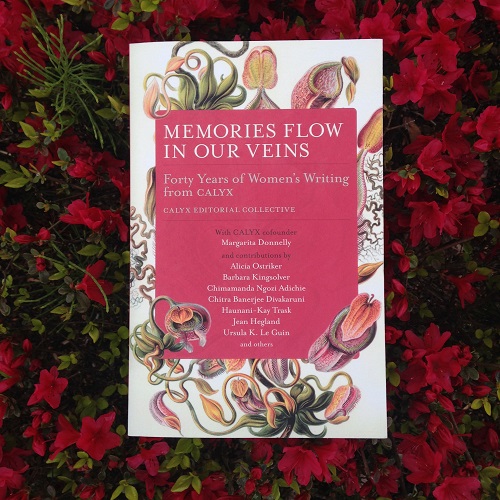Truly feminist collectives are difficult to maintain. At CALYX we try to have titles without having rank, to vote on material without kowtowing to a rigid majority rule, and to celebrate our big-name authors alongside those who are up and coming. It takes effort and hard work to go against the grain, to always stay mindful of each member’s intrinsic value to a forty-year-old publication.
But sometimes, feminist collectives are the most natural systems in the world. The collective that chose material for our fortieth anniversary anthology, Memories Flow in Our Veins, was one of those zen moments where everything clicked and the joy of the work was present at every meeting.
Over the course of several months in mid-2014, our editors and personnel read through the incredibly rich and diverse material that CALYX has published over four decades. Stacks of journals. Dozens of books. The system wasn’t perfect. Each editor was assigned a year, or five years, or a decade, and given the staggering task of choosing representative poetry and prose to be featured in the anthology from those years. What an overwhelming responsibility.
It’s difficult culling material this way. Everything that CALYX has published was chosen because it spoke to someone, because it was polished, because it was doing something new with content or craft. So choosing the “best” pieces was, of course, impossible.
The way it happened was much more organic than any rigid system. Each of us came to the meetings with a list of possible choices, but it didn’t come down to recognizable names or cherry-picking from certain decades. My first meeting I sat down next to our editor Marjorie and said, “I found a story about a woman keeping a rotting pig’s head in her fridge. It was fantastically creepy.” This spoke to everything that makes Marjorie who she is. It had to go in.
The next meeting, Lill, a prose editor, remembered a short story about a woman whose boyfriend has aged backward into a toddler. The story hadn’t been chosen in the first round of readings, but it was immediately added to the discussion (and, eventually, the anthology) because the value of it was immediately clear. CALYX is full of stories that touched people, intrigued them, and stayed with them over the years. It’s not about votes or consensus. It’s about the deep place where good literature changes us.
With a perfect mixture of editors encountering the work for the first time and people who had been involved from the beginning of CALYX, this anthology is as much a product of those meetings as it is the product of forty years of brilliant writing and thousands of hours of editorial work. We could never have set a definitive representation of CALYX because CALYX is something different for every writer, every editor, and every reader.

